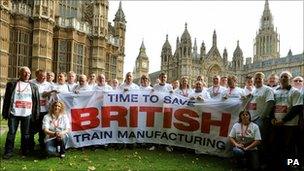Bombardier trains decision 'will not be reviewed'
- Published

Bombardier workers travelled to Parliament to protest at the contract decision
A decision to select Germany's Siemens for a £1.4bn train contract, rather than Bombardier in the UK, will not be reviewed or put out to tender again, the transport secretary has said.
Philip Hammond told a committee of MPs that 1,400 redundancies at the firm's Derby factory were "regrettable".
But he said delaying the Thameslink trains contract would be unacceptable.
Unions have been urging the government to reverse its decision to make Siemens the preferred bidder.
Mr Hammond told the Transport Select Committee that the government was keen to see if any lessons could be learnt for future contracts.
"We need to look at how things are done in other European Union member states, how socio-economic factors are taken into account without breaching EU law," Transport Secretary Phillip Hammond told MPs.
The government said in June that the Siemens bid to build 1,200 train carriages represented the best value for money, and that it was following EU procurement rules, which do not allow where companies are based to be taken into account.
Legal advice had suggested that making local employment a condition of a contract would be illegal, he added.
Job losses
While Bombardier is laying off staff, Siemens has said that it will create 2,000 jobs across the UK as a result of winning the contract for the Thameslink route between Bedford and Brighton.
Colin Walton: "Finances played an extremely important part of this deal as apposed to actually choosing the best train first."
However, Siemens will build the trains in Germany and only 300 of the UK jobs it creates will be directly employed manufacturing posts, at a factory at Hebburn, South Tyneside.
Prior to the coalition's decision to choose Siemens, Canada's Bombardier said that it would have to lay off 1,200 workers in Derby from October as it adjusted to finishing other major contracts.
But Mr Walton said the Thameslink contract, which is due to start in 2014, would have allowed the company to mitigate job losses and retain all permanent staff.
"I did not understand how they would have done that," Mr Hammond said, referring to the gap between the end of current contracts and the start of the Thameslink one.
"It may have been that work could have been brought in from elsewhere."
Financial questions
The chairman of Bombardier UK told MPs on the select committee that firm is "struggling to understand" the government's decision, that he said had been based on "very narrow" criteria.
Mr Walton said the decision to make Siemens the preferred bidder was not based solely on the best product, but on the finances behind the two rival offers to build, finance and maintain new train carriages for the Thameslink route.
"Finances played an extremely important part in this deal as opposed to choosing the best train," he said.
Professor Karel Williams of the University of Manchester, also giving evidence, said that once the decision to take finances into account was made, it was "almost inevitable that the company with the higher credit rating [would win]".
He said Siemens had a credit rating of A+ compared with Bombardier's B++.
This would make a difference of about £500m in financing costs for the government over the course of the contract, he said.
Mr Hammond said clearly finance played a part in the 30-year contract, but he said it would be wrong to say that the difference in the two companies' credit ratings was key to the decision.
"It will have been a factor, but it is unlikely to have been a determining factor," he told MPs.
'Deeply concerned'
Transport Secretary Phillip Hammond said the credit rating was unlikely to be a determining factor
Mr Walton also raised concerns about the knock-on effects of the contract loss, not only in Derby but across the country. Bombardier has an "extensive supply chain across the UK", he said.
Diane Holland, assistant general secretary of the Unite union, also at the hearing, said 800 sites in total would be affected, half of which had either cut jobs or planned to do so as a result of the government's decision to go with Siemens.
"We are deeply, deeply concerned about a contract awarded on the basis of a credit rating rather than an ability to manufacture trains," she said.
Mr Hammond said the government would be looking at ways to try to retain skills in the train building industry in the UK.
"The Derby plant has a significant design capability and retaining that design capability is the key to Bombardier's future in the UK."
He said the business department would be trying to encourage Japan's Hitachi, which will be establishing a new factory in County Durham to build high-speed trains, to tap into UK's design expertise in future.
- Published5 July 2011
- Published5 July 2011
- Published3 July 2011
- Published16 June 2011
- Published16 June 2011